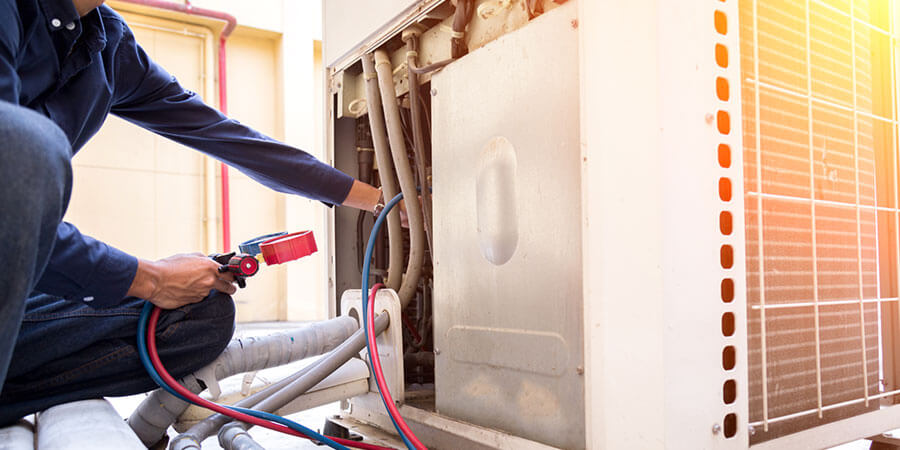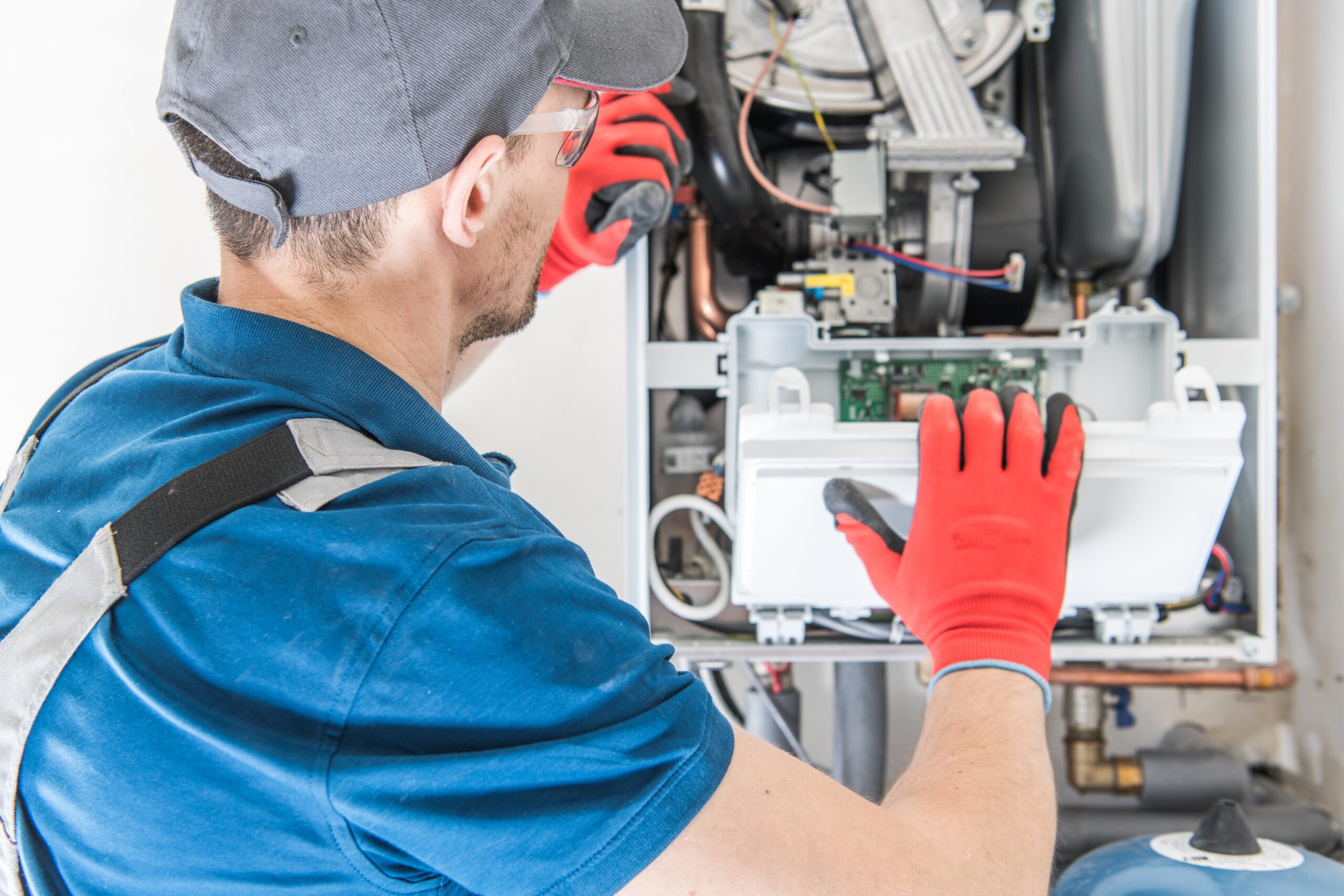Selecting In Between a Heatpump and Heater: Trick Factors To Consider for Your HVAC Needs
When assessing heating choices for cooling and heating requires, the choice in between a warmth pump and a heating system can be complicated. Each system uses distinctive advantages tailored to certain environments and power performance objectives. Recognizing these distinctions is vital for making an educated choice. Key elements such as installation prices and ecological effect additionally complicate the selection procedure. Which alternative genuinely lines up with one's comfort and sustainability preferences? The adhering to areas will explore these factors to consider carefully.
Understanding Heat Pumps: How They Function and Their Benefits
While many home owners take into consideration different home heating options, recognizing exactly how heat pumps function and their advantages can greatly affect their decision. Warmth pumps operate by moving warm instead of creating it. In the winter season, they extract warmth from the outside air or ground and transfer it inside, while in the summertime, they reverse this process, cooling down the home by removing warm outside. This dual performance makes them versatile for year-round environment control.One of the primary advantages of heatpump is their power efficiency. They utilize considerably much less electricity contrasted to traditional heating unit, possibly resulting in reduced energy bills (ductless mini splits). Furthermore, heatpump have a smaller carbon impact, making them an eco-friendly choice. They likewise call for less maintenance than standard systems, adding to long-term expense financial savings. On the whole, understanding the auto mechanics and benefits of warmth pumps can aid homeowners make informed choices regarding their home heating and cooling down needs
Checking Out Heaters: Types, Operation, and Advantages
Heating systems can be found in numerous kinds, consisting of gas, electrical, and oil versions, each with distinctive operational systems. Recognizing these distinctions is important, as they affect effectiveness and heating performance. Additionally, furnaces offer various benefits, such as regular warmth output and reliability in colder environments.
Kinds of Heaters
Furnace can differ significantly in style and procedure, with heating systems being a prominent choice among home owners. There are numerous kinds of heating systems, each using various gas resources and technologies. Gas furnaces are common, leveraging all-natural gas to generate warm efficiently. Electric heaters, on the various other hand, utilize electrical resistance to produce warmth, frequently preferred for their simple installation. Oil heaters, while less common, are reliable in areas with minimal gas gain access to (heat pump installation ooltewah tn). In addition, condensing furnaces take full advantage of power efficiency by reusing and catching exhaust gases. Each kind operates via a system of warm exchangers and ductwork to disperse warm air throughout a home. Recognizing the distinctions in between these furnace kinds is important for educated HVAC choices
Advantages of Heaters
For property owners looking for trustworthy warmth throughout cold months, the advantages of heaters are significant. Heating systems provide constant home heating, making certain also temperatures throughout the home. They are especially reliable in extreme cold, commonly surpassing heatpump in cold problems. Various types, including gas, electric, and oil heating systems, use flexibility to meet diverse needs and preferences.Furnaces likewise have a tendency to have lower preliminary installment prices contrasted to heatpump, making them an extra available choice for numerous. Their robust style adds to a longer lifespan, with numerous devices lasting over 15 years with proper upkeep. Additionally, modern furnaces are typically furnished with sophisticated innovation for enhanced efficiency, which can lead to reduced energy costs. On the whole, heaters continue to be a reputable selection for efficient home heating.

Energy Effectiveness: Comparing Heat Pumps and Furnaces
When comparing power efficiency in between heatpump and heaters, the Seasonal Power Effectiveness Ratio (SEER) plays a vital function in figuring out performance. Additionally, a functional price analysis reveals the long-term economic effects of each system. Comprehending these aspects can direct property owners in making notified decisions concerning their home heating options.
Seasonal Energy Efficiency Proportion
Energy effectiveness plays a crucial function in the decision-making process in between heatpump and heating systems, particularly when taking into consideration the Seasonal Energy Performance Proportion (SEER) This metric procedures the cooling efficiency of heatpump over an entire air conditioning season, giving a standardized means to evaluate performance. Greater SEER ratings suggest greater power efficiency, equating to reduced energy usage and reduced energy bills. On the other hand, furnaces are generally evaluated utilizing the Annual Gas Utilization Effectiveness (AFUE) rating, which shows home heating efficiency. When comparing these 2 systems, homeowners must focus on SEER ratings for heatpump, as they straight impact general power savings and environmental sustainability. A thorough understanding of SEER can notably influence the lasting satisfaction and cost-effectiveness of the selected a/c remedy.
Functional Cost Analysis
Comprehending the functional prices related to heatpump and heaters is essential for homeowners assessing their choices. Heatpump commonly offer higher power efficiency, converting electric energy into heat with very little waste. This leads to lower monthly energy expenses, specifically in moderate environments. Alternatively, typical heaters, specifically gas designs, might have lower upfront costs but can sustain greater operational expenses over time due to sustain rates and effectiveness ratings.Moreover, warm pumps can work as both heating and cooling systems, possibly minimizing the requirement for separate HVAC devices. While first investments for warmth pumps might be higher, their lasting cost savings in energy performance can make them a much more affordable choice for several families. Cautious evaluation of regional power rates is vital to identify the ideal alternative.
Installment Prices: What to Expect for each and every Furnace
Installation expenses for furnace can vary substantially between heatpump and heating systems, affecting house owners' decisions. Warm pumps generally have greater ahead of time setup prices, generally varying from $3,500 to $8,000, depending upon the system dimension and complexity of setup. This consists of the outdoor system, interior handling system, and necessary ductwork adjustments. Conversely, heaters have a tendency to have reduced initial expenses, balancing in between $2,500 and $6,000, which can be appealing for budget-conscious property owners. Nonetheless, installation expenses can enhance if considerable ductwork is required.Moreover, the choice of fuel type for heaters-- gas, lp, or electric-- can also impact setup costs. While heatpump use energy efficiency, their preliminary financial investment might hinder some purchasers. Ultimately, reviewing setup costs together with long-lasting cost savings and effectiveness will certainly assist home owners in making informed choices about their heating unit.
Environment Factors To Consider: Which System Carries Out Better in Your Area
Exactly how do climate conditions affect the efficiency of home heating systems? The efficiency of heatpump and heaters can vary greatly depending on the neighborhood climate. In modest environments, heat pumps excel by efficiently moving heat from the outdoors air, making them an energy-saving alternative. Their efficiency lessens in extremely chilly temperatures, where they might battle to remove adequate heat. Alternatively, heating systems, especially gas designs, provide reputable and consistent heat no matter outdoor problems, making them preferable in chillier regions.In locations that experience milder winters, heatpump can operate successfully year-round, providing both heating and air conditioning. On the other hand, areas with rough winter seasons often take advantage of the effectiveness of furnaces. Eventually, understanding the regional environment is essential when making a decision between a heat pump and a heating system, as it straight influences their functional performance and overall performance.
Upkeep Needs: Long-Term Look After Heat Pumps vs. Furnaces
While both warmth pumps and heaters need regular upkeep to ensure peak performance, their details requirements and care regimens vary considerably. Furnaces typically require less frequent interest, with annual evaluations sufficing to look for gas leakages, tidy filters, and examine overall capability. Their easier design usually enables straightforward repairs.In comparison, heat pumps demand biannual upkeep because of their twin role in heating & cooling. This includes cleansing coils, checking cooling agent degrees, and guaranteeing that both the interior and outdoor units operate at their finest. Furthermore, heat pump upkeep commonly involves more detailed components, making expert maintenance essential.Neglecting upkeep can bring about reduced effectiveness and raised energy expenses for both systems. Ultimately, homeowners ought to take into consideration these long-term care needs when choosing in between a warm pump and a heating system, as aggressive upkeep can expand the life-span and efficiency of either system substantially.
Environmental Effect: Choosing a Lasting Heating Alternative
The environmental impact of home heating systems is an important analysis for home owners seeking sustainable options. Heatpump are typically a lot more energy-efficient than standard heaters, as they transfer heat instead than generate it, significantly decreasing carbon discharges. By making use of renewable resource sources, such as air-source or geothermal warmth pumps, homeowners can better decrease their eco-friendly footprint.On the other hand, all-natural gas heating systems discharge greenhouse gases and add to air pollution, though they frequently offer higher heat result. Nevertheless, improvements in innovation have led to the growth of high-efficiency heaters that minimize emissions.Ultimately, picking a home heating system Go Here entails weighing efficiency versus environmental influence. Property owners are encouraged to assess regional energy sources and rewards for eco-friendly systems, ensuring a selection that lines up with both personal convenience and environmental duty. The decision influences not only immediate comfort yet additionally lasting sustainability and environmental health and wellness.
Frequently Asked Inquiries
Just How Lengthy Do Warmth Pumps and Furnaces Typically Last?
The life expectancy of warmth pumps usually ranges from 15 to two decades, while heaters can last in between 15 to 30 years. Regular maintenance substantially influences their longevity and efficiency in providing heating options.
Can I Utilize a Heatpump in Incredibly Cold Climates?
Heatpump can run in incredibly chilly environments, however their performance diminishes as temperatures drop. In such problems, supplementary heating sources may be needed to preserve comfortable indoor temperatures and ensure peak performance.

What Is the Sound Degree of Warmth Pumps Versus Furnaces?
The noise levels of heat pumps and heating systems differ substantially. Generally, warm pumps operate more quietly than typical heaters, making them more suitable for those conscious seem, while heaters might generate louder functional sounds throughout home heating cycles.
Are Warmth Pumps Suitable for Both Heating & Cooling?
Heatpump are without a doubt ideal for both home heating and air conditioning (furnace replacement). They operate by moving warm, offering efficient temperature control year-round, making them a versatile selection for homeowners looking for an all-in-one HVAC remedy
What Size Heating Unit Do I Required for My Home?
Establishing the ideal dimension heater for a home requires evaluating variables such as square video, insulation high quality, local environment, and the home's design. Consulting a professional can assure an exact assessment and perfect convenience. Warm pumps usually provide greater energy performance, transforming electric power right into warm with minimal waste. In modest climates, warmth pumps stand out by efficiently moving heat from the outdoors air, making them an energy-saving option. Alternatively, heating systems, particularly gas designs, provide consistent and trusted warm no matter of outdoor problems, making them preferable in cooler regions.In areas that experience milder wintertimes, heat pumps can operate find this successfully year-round, giving both heating and air conditioning. Heat pumps are normally extra energy-efficient than conventional heaters, as they transfer warm instead than create it, significantly minimizing carbon emissions. By using eco-friendly power sources, such as geothermal this article or air-source warmth pumps, homeowners can even more minimize their eco-friendly footprint.On the other hand, natural gas heating systems send out greenhouse gases and add to air contamination, though they usually offer greater warm result.